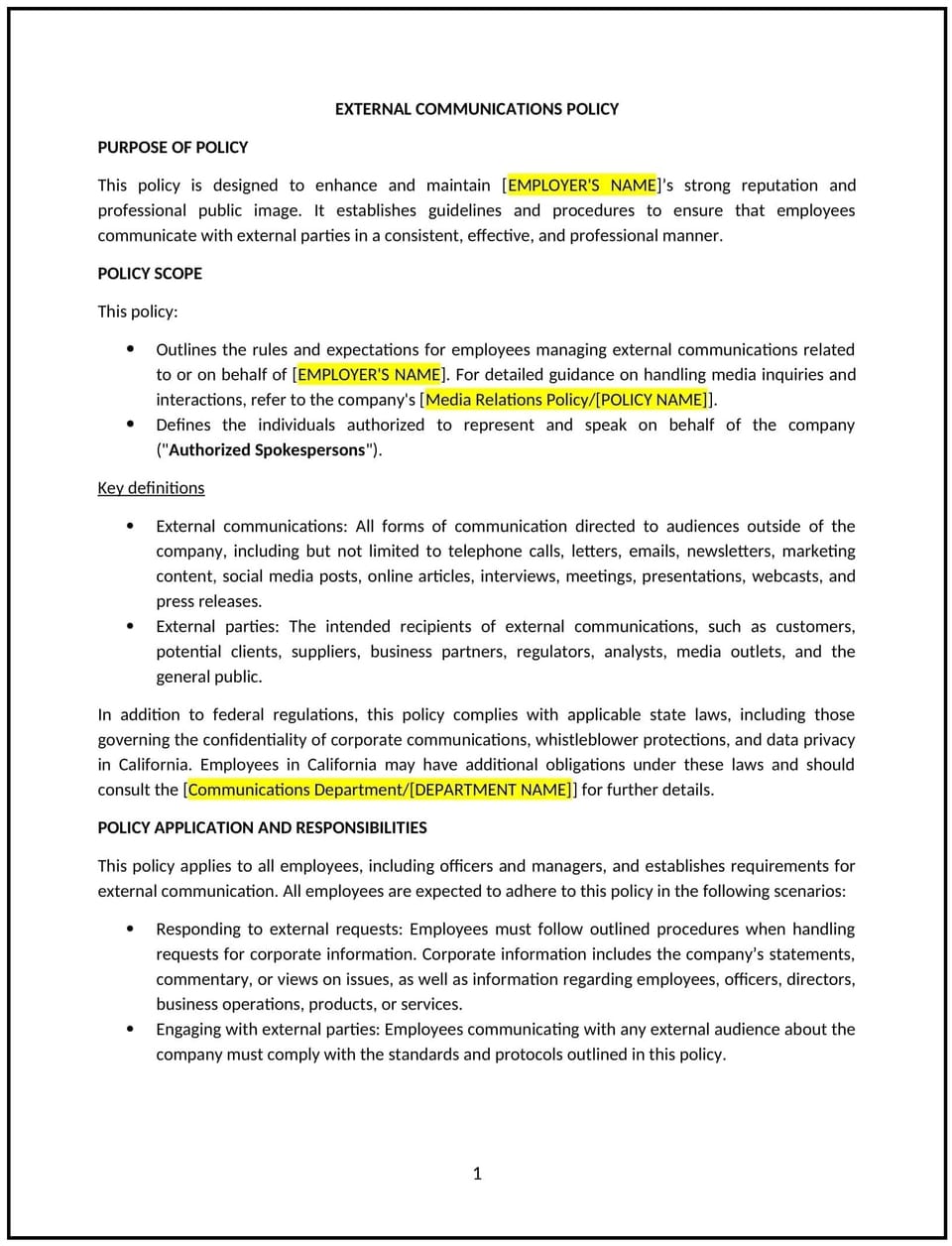External communications policy (California): Free template

External communications policy (California)
In California, an external communications policy provides businesses with guidelines for managing all forms of communication with external parties, such as media, clients, and the public. This policy ensures that communications align with the business’s objectives, protect its reputation, and support compliance with California laws, including privacy and consumer protection regulations.
This policy outlines the roles, responsibilities, and approval processes for external communications. By implementing this policy, California businesses can maintain consistency, mitigate risks, and promote clear and accurate messaging.
How to use this external communications policy (California)
- Define communication channels: Specify the types of external communications covered, such as press releases, social media posts, and client correspondence.
- Assign spokespersons: Designate authorized individuals to represent the business in public forums or media interactions.
- Establish approval processes: Outline steps for reviewing and approving communications before release, ensuring accuracy and compliance.
- Address confidentiality: Prohibit the disclosure of sensitive business information, including trade secrets or proprietary data, without authorization.
- Train employees: Educate staff on their roles in external communications and the importance of adhering to the policy.
Benefits of using this external communications policy (California)
This policy offers several advantages for California businesses:
- Supports compliance: Reflects California laws governing privacy, advertising, and consumer communication standards.
- Protects reputation: Ensures consistent messaging that aligns with the business’s values and objectives.
- Reduces risks: Minimizes potential liabilities arising from inaccurate or unauthorized communications.
- Promotes accountability: Clarifies roles and responsibilities for external messaging.
- Enhances clarity: Ensures external communications are clear, accurate, and professional.
Tips for using this external communications policy (California)
- Reflect California-specific laws: Address legal requirements for external communications, such as advertising disclosures and privacy considerations under the CCPA.
- Monitor compliance: Regularly review external communications to ensure they align with the policy and legal standards.
- Provide training: Educate employees and authorized spokespersons on best practices for public communications.
- Use approval workflows: Implement structured approval processes to review messaging before public release.
- Update regularly: Revise the policy as needed to reflect changes in California laws, business practices, or communication channels.
Q: How does this policy benefit the business?
A: This policy supports compliance with California laws, protects the business’s reputation, and ensures consistent and professional messaging.
Q: Who is authorized to communicate with external parties under this policy?
A: Authorized spokespersons, such as designated executives or PR representatives, are responsible for communicating on behalf of the business.
Q: How does this policy support compliance with California laws?
A: The policy reflects state privacy and advertising standards, ensuring lawful and transparent communications with external parties.
Q: What steps should employees take before releasing external communications?
A: Employees should follow the approval process outlined in the policy, ensuring messages are reviewed and authorized before distribution.
Q: How can the business ensure consistency in external communications?
A: The business can establish standardized templates, provide training, and enforce approval workflows for all external messaging.
This article contains general legal information and does not contain legal advice. Cobrief is not a law firm or a substitute for an attorney or law firm. The law is complex and changes often. For legal advice, please ask a lawyer.


